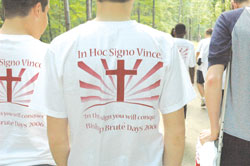2006 Youth Supplement
When God calls, are you listening to his plans for you?

Photo caption: T-shirts worn by participants at Bishop Bruté Days in June show the message that guides people of faith: “In this sign, you will conquer.” The annual retreat helps teenage boys grow in their faith and be open to a possible call to the priesthood. (Photo by Sean Gallagher)
By Kristen Casey (Special to The Criterion)
A vocation is defined as “a summons or strong inclination to a particular state or course of action” by the Merriam-Webster Dictionary. The word “vocation” comes from the Latin word “vocare,” which means “to call.”
It is appropriate to realize this because when Holy Mother Church talks about vocations, she means precisely that. It is a calling; a call from God to a particular way and state of life. It is God calling us to live our lives according to His will so that we may attain holiness and salvation.
When most people think about vocations today, they think of the priesthood or consecrated religious life. This is true—both of those states of life are vocations—but we must not forget that marriage itself is also a vocation.
Each person has a specific calling, or vocation, from God for his or her life. However, the Catechism of the Catholic Church portrays vocations in two ways: being very specific to each person and also being general for all of humanity.
The vocation of humanity is to show forth the image of God and to be transformed into the image of the Father’s only Son. This vocation takes a personal form since each of us is called to enter into the divine beatitude; it also concerns the human community as a whole.
We are all called to image God, revealed in the Most Holy Trinity, to the rest of humanity. There are, however, different ways that we are each called to do this. Personally, I believe that my call—my vocation—is to the ordained priesthood of Jesus Christ; thus, I am in seminary.
I did not always think about being a priest. Some guys have thought about it and wanted to become a priest since they were very young. To me, that is amazing, but it’s not my story. I never even thought about being a priest until my last couple of years in high school. Even when I began to think about it, or hear the call, I tried to run from it.
Eventually, through many conversations with priests and friends, I knew that if I wanted to be happy in life and glorify God, I would have to give the priesthood some serious thought. I was advised to spend time with our Lord in the Blessed Sacrament, begging him to help me discern my vocation. Through much prayer and contemplation, I finally made the decision to enter the seminary.
I am now beginning my second year at the Bishop Simon Bruté College Seminary at Marian College in Indianapolis and am still trying to be formed in a way that will bring the most glory to God. Including this year, I have seven more years of formation and discernment before Holy Mother Church would ordain me a priest. This clearly shows that the vocation of priesthood requires serious discernment.
However, every vocation requires a long period of prayerful discernment. That includes marriage. Marriage is by no means a “default” lifestyle for people who aren’t called to the priesthood or religious life. It is a holy and unique vocation in and of itself. Thus, marriage requires an extended period of prayer and discernment so that the people entering into that great sacrament can strive to live holy lives devoted to the service of our Lord by being images of God to other people.
The most important point I believe that we can realize is that whatever lifestyle we are being called to, we must undertake that life—that call, that vocation—with great humility and prayer.
This allows us to follow the great example of John the Baptist when he said, “He must increase, but I must decrease” (Jn 3:30). A vocation is a way of increasing the presence of God amongst us while recognizing that the world and everything in it is not ours. Only then can we “show forth the image of God and be transformed into the image of the Father’s only son” (Caterchism of the Catholic Church, #1877).
(Kristen Casey is a seminarian for the archdiocese and a member of St. Barnabas Parish in Indianapolis.) †
